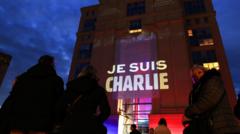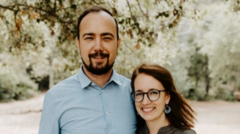A recent verdict in France underscores ongoing tensions between educational values and extremist ideologies.
French Court Sentences Eight Individuals in Samuel Paty Murder Case

French Court Sentences Eight Individuals in Samuel Paty Murder Case
Convictions highlight the reverberations of radicalism following the brutal assassination of a teacher
In a landmark ruling delivered by a Paris court, eight individuals were convicted for their involvement in the tragic murder of Samuel Paty, a history teacher brutally killed in 2020. Paty was beheaded by Abdoullakh Anzorov, an 18-year-old Russian of Chechen origin, who was incensed by the teacher's decision to show caricatures depicting the Prophet Muhammad during a civics lesson aimed at illustrating the concept of free speech.
The shocking act of violence took place near Paty's school, located northwest of Paris, catalyzing fears about the safety of educators in a climate marked by rising Islamist extremism. The police swiftly neutralized Anzorov after the attack, signaling a strong response to a crime that reignited national discourse surrounding liberty, secularism, and the obligations of public education.
The court proceedings revealed that among the convicted were Naïm Boudaoud and Azim Epsirkhanov, both 22 and 23 years old respectively, accused of aiding Anzorov by procuring weapons, including a knife for the attack. Additionally, Boudaoud was implicated in driving Anzorov to the vicinity of the school. Both individuals claimed innocence, asserting they were unaware of any malicious intentions.
Furthermore, two other defendants faced charges for fomenting an online smear campaign against Paty that drew Anzorov’s attention from a considerable distance, further complicating the narrative of this case. The conviction serves not only as a reminder of the horrors associated with extremism but also as a troubling indication of how educational environments can become battlegrounds for ideological conflicts.
The shocking act of violence took place near Paty's school, located northwest of Paris, catalyzing fears about the safety of educators in a climate marked by rising Islamist extremism. The police swiftly neutralized Anzorov after the attack, signaling a strong response to a crime that reignited national discourse surrounding liberty, secularism, and the obligations of public education.
The court proceedings revealed that among the convicted were Naïm Boudaoud and Azim Epsirkhanov, both 22 and 23 years old respectively, accused of aiding Anzorov by procuring weapons, including a knife for the attack. Additionally, Boudaoud was implicated in driving Anzorov to the vicinity of the school. Both individuals claimed innocence, asserting they were unaware of any malicious intentions.
Furthermore, two other defendants faced charges for fomenting an online smear campaign against Paty that drew Anzorov’s attention from a considerable distance, further complicating the narrative of this case. The conviction serves not only as a reminder of the horrors associated with extremism but also as a troubling indication of how educational environments can become battlegrounds for ideological conflicts.




















